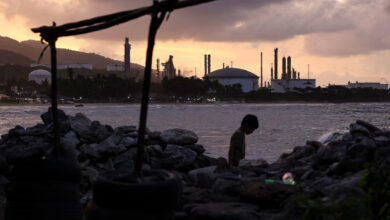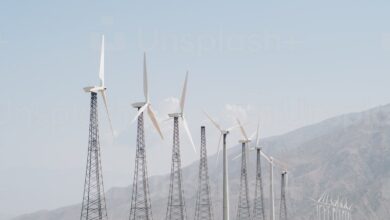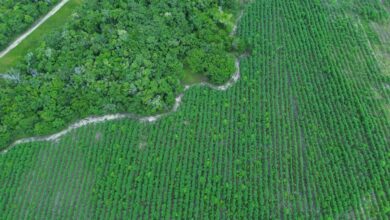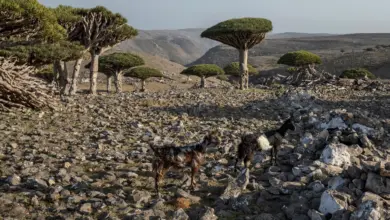In late November, the Arab Forum for Environmental Development (AFED) released its second report on the potential impact of climate change on Arab countries. In the report, AFED–a regional NGO devoted to environment and sustainable development in the Arab world–recommends region-specific measures aimed at mitigating the anticipated consequences of climate change.
In spite of the region’s relatively small 4.2 percent contribution to global greenhouse gas emissions, the report states, the Middle East remains one of the most vulnerable areas in the world to climate change. “Damage associated with climate change is not distributed proportionately according to emissions,” the report notes, pointing out that the regions least responsible for global warming will be hit the hardest.
Mohamed el-Raey, professor of environmental physics at the University of Alexandria, is the author of the section of the report that focuses on coastal areas. “The Arab World urgently needs to gather sufficient data about the looming consequences of climate change and to coordinate its activities, both nationally and regionally,” el-Raey said.
The report points to the overall lack of data and research on the potential impact of climate change on regional health, infrastructure, biodiversity, tourism and water and food production.
For el-Raey, Egypt’s first priority is coordination. “At the moment, each body of research concentrates on its own field–such as agriculture or coastal zones–without coordination between them,” he said. “We need to coordinate our actions to identify vulnerable areas more efficiently and explore means of adapting to climate change."
With respect to confronting the phenomenon, each country’s priorities vary according to its own set of geographic and demographic circumstances. Some must take emergency measures to combat frequent flash-floods, while others should deal with increasing average temperatures.
Egypt, according to the report, must give priority to the threat of Sea Level Rise (SLR), since twelve percent of the country’s total agricultural land is currently at risk of a one-meter rise in the sea level. This, in turn, endangers more than 6 percent of the country’s GDP, making Egypt’s economy the most vulnerable in the region to the potential effects of climate change.
“And the latest predictions concerning SLR have been revised upwards–we’re now talking about a 190cm rise by the turn of the century,” said el-Raey, pointing in particular to the potentially adverse effects on Egypt’s Nile Delta region. “SLR would affect a highly populated area and three very vulnerable sectors, including water resources, agriculture and tourism.”
According to the concerned professor, Egyptian policymakers have finally realized the gravity of the situation. “Now we need to be financially and technically supported to prevent disaster,” he said.
Ambassador Magda Shahin, director of the Trade-Related Assistance Center at the American Chamber of Commerce in Egypt, authored the chapter of the report devoted to the interrelation between climate change and trade.
She calls for mutual efforts by both developed and developing countries to curb greenhouse gas emissions, even though the Arab world’s share of emissions has remained small by comparison. “But I also believe that developed countries have the responsibility to help us mitigate our carbon emissions through technology transfer and financial support,” Shahin said.
Both Shahin and el-Raey see the region as fertile ground for the development of alternative energies. A handful of green initiatives recently launched in the Arab world appear to confirm this, including the commercialization of wind energy, the use of solar heating, the introduction of compressed natural gas as a transport fuel and the first "zero-carbon" city in Abu Dhabi.
Unfortunately, the report notes, such initiatives remain fragmented and have yet to be carried out on the regional level.
Shahin also deplores the lack of clean-technology transfer from developed to developing countries.
“I’ve been calling for this transfer for the past ten years. Stop dumping your old technology on us and help us use clean technology,” she implored. “Egypt has great potential for solar and biomass energy, but the country needs help producing and exporting these energies–and this isn’t happening.”
Through international trade agreements, developed countries are often accused of citing "environmental protection" as a justification for imposing costly regulations on imported products, thus making them less competitive on the international market.
“These trade agreements use environmental protection as a form of trade protectionism to make it harder for developing countries to export their goods," explained Shahin. “This means that the money we make from exports isn’t sufficient to make a profit and clean up the environment.”
In order to become more environment-friendly, she adds, Arab countries should be offered incentives–such as financial assistance and clean-technology transfer– rather than threatened with trade sanctions.
According to el-Raey, Egypt is taking a step in the right direction by exploring alternative energy technologies. Nevertheless, he stressed, “SLR should top the agenda, since Egypt’s share of greenhouse gas emissions is around 0.7 percent of the global total, which is very limited.”
El-Raey went on to predict that the development of alternative energy projects would bear fruit in 20 to 30 years’ time. "But these won’t save us from the impact of climate change on the coastal areas, which should represent our-number one priority,” he said.




